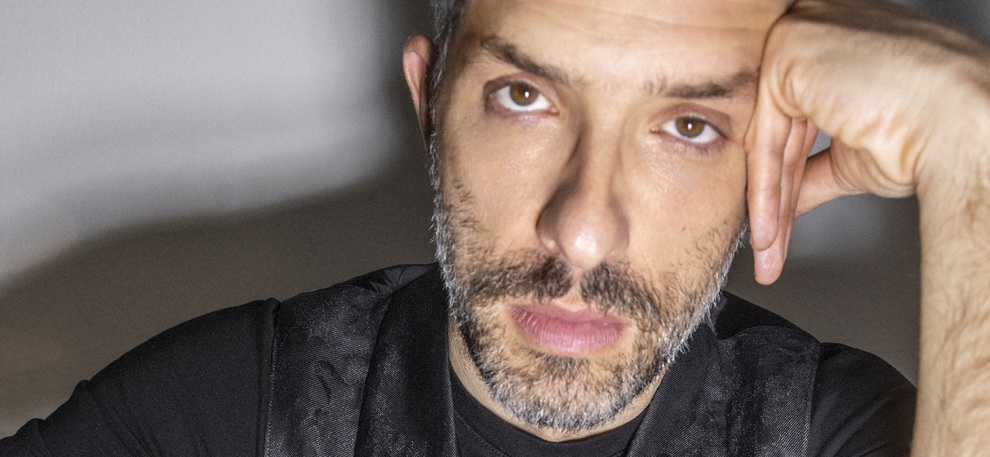So 05.07.2026, 11.00 Uhr | Elbphilharmonie, Großer Saal
10. Philharmonisches Konzert
BRUCH / ASSIGINAAK
ZEITSPIEL ZEHN: MAX BRUCH / BARBARA ASSIGINAAK: Violinkonzert Nr. 1 g-Moll op. 26 I. „Niibaashkaa – Travels at Night“ (Überschreibung von Barbara Assiginaak, UA) / II. Adagio / III. Finale. Allegro energico
-
Antonín Dvorák: Sinfonie Nr. 9 e-Moll op. 95 „Aus der Neuen Welt“
Dirigent: Omer Meir Wellber
Violine: Hillary Hahn
Philharmonisches Staatsorchester Hamburg
Omer Meir Wellber
DirigentOmer Meir Wellber gehört zu den führenden Dirigenten für Opern- und Orchesterrepertoire. Er ist Music Director des Teatro Massimo Palermo und aus langer Verbundenheit der Raanana Symphonette in Israel. Ab der Saison 2025/2026 wird Wellber Generalmusikdirektor und Chefdirigent der Hamburgischen Staatsoper sowie Hamburgischer Generalmusikdirektor beim Philharmonischen Staatsorchester. Omer Meir Wellber ist regelmäßig bei u. a. dem Gewandhausorchester zu Leipzig, dem NDR Elbphilharmonie Orchester, dem Swedish Radio Symphony Orchestra, dem London Philharmonic Orchestra, dem Orchestra del Teatro dell'Opera di Roma, dem City of Birmingham Symphony Orchestra, der Staatskapelle Dresden, der Deutschen Kammerphilharmonie Bremen, dem Israel Philharmonic Orchestra, den Wiener Symphonikern, dem Rundfunk-Sinfonieorchester Berlin sowie dem Tonhalle-Orchester Zürich zu Gast.
In der neuen Spielzeit des Teatro Massimo in Palermo präsentierte Omer Meir Wellber Bellinis Oper I Capuleti e i Montecchi in einer Inszenierung von Idan Cohen und er dirigierte Wagners Oper Tristan und Isolde in der Regie von Daniele Menghini. Zu den Höhepunkten der letzten Spielzeiten gehören Neuinszenierungen des Kaiserrequiem - einer eigenen Kreation mit dem Regisseur Marco Gandini, welche Viktor Ullmans Der Kaiser von Atlantis mit Mozarts Requiem verbindet, Verdis Les Vêpres siciliennes in einer Inszenierung von Emma Dante und Wagners Parsifal in einer Inszenierung von Graham Vick. Für seine innovative Arbeit am Teatro Massimo, darunter die Produktion Crepuscolo dei sogni im Januar 2021, erhielt er den Sonderpreis 2021 der italienischen Associazione Nazionale Critici Musicali (Nationaler Verband der Musikkritiker).
In seiner Zeit als Musikdirektor der Volksoper Wien, die 2023 im Dezember auf eigenen Wunsch endete, dirigierte Omer Meir Wellber Tschaikowskys Jolanthe und der Nussknacker, eine Neukreation in der Regie von Lotte de Beer und zahlreiche Wiederaufnahmen, wie z.B. La Traviata, Mozarts Zauberflöte und Richard Strauss‘ Salome (in einer Rekreation von Luc Bondys zeitloser Inszenierung von 1992). Unter der Leitung von Omer Meir Wellber gab es außerdem Gastspiele des Volksopernorchesters beim Schleswig-Holstein Musik Festival, Schloss Esterházy in Eisenstadt sowie die gesteigerte Präsenz in Wien im Wiener Konzerthaus u.a. mit einer Aufführung von Verdis Messa da Requiem. Er ist der Volksoper auch in 2024/25 weiterhin sehr verbunden und dirigiert seine zwei ursprünglich geplanten Neuproduktionen: Ella Milch-Sheriffs Auftragskomposition, ihre neue Oper „Alma“ und seine Kreation des Kaiserrequiem mit dem Wiener Staatsballett, Regie und Choreographie von Andreas Heise.
Gastspiele in der Saison 2023/24 führen Omer Meir Wellber zu diversen Festivals im In- und Ausland mit der Deutschen Kammerphilharmonie Bremen, nach Rom mit dem Orchestra del Teatro dell'Opera di Roma, nach Leipzig mit dem Gewandhausorchester, nach Prag mit dem Radio-Sinfonieorchester Prag, nach Asien (Japan, Korea und Taiwan) mit den Wiener Symphonikern, nach Paris mit dem Orchestre National de France und nach Hamburg mit dem NDR Elbphilharmonie Orchester.
Als Music Director des Toscanini Festivals 2023 in Parma präsentierte Wellber eine Mischung aus Sinfonie- und Kammermusikkonzerten und führte die Filarmonica Arturo Toscanini zu den Dresdner Musikfestspielen. Bei der ersten Ausgabe des Festivals im Jahr 2022 dirigierte Wellber eine konzertante Fassung von Puccinis selten gespielter Oper Les Willis.
Als Porträtkünstler 2022 des Schleswig-Holstein Musik Festivals war Omer Meir Wellber am Dirigentenpult sowie am Akkordeon, Cembalo und Flügel zu erleben und hat unter dem Motto „Freundschaft“ 14 abwechslungsreiche und unkonventionelle Konzerte präsentiert. Neben klassischen Orchesterkonzerten mit dem Festivalorchester des SHMF und dem BBC Philharmonic standen dabei auch Kammermusik- und Chansonabende sowie ein vierhändiger Klavierabend auf dem Programm. Getreu dem Motto "Freundschaft" musizierte Omer Meir Wellber gemeinsam mit u. a. dem Mandolinisten Jacob Reuven, der Schauspielerin Isabel Karajan, den Pianisten Fazil Say und Daniel Ciobanu, der Violinistin Veronica Eberle und dem Klarinettisten Alessio Vicario.
Die jüngsten CD-Aufnahmen von und mit Omer Meir Wellber erschienen im Mai 2022: The Mandolin Seasons mit Jacob Reuven und der Sinfonietta Leipzig (MusikerInnen des Gewandhausorchesters Leipzig) bei Hyperion und Pop Songs mit dem Cellisten Jan Vogler und dem BBC Philharmonic bei Sony. Frühere Veröffentlichungen beinhalten die erste gemeinsame Aufnahme von Wellber und dem BBC Philharmonic mit Werken von Ben-Haim (Chandos), Taveners No longer mourn for me mit Steven Isserlis und dem Philarmonia Orchestra (Hyperion) sowie DVD-Veröffentlichungen von Wagners Parsifal (Unitel/C Major), Bellinis I capuleti e i montecchi (Naxos), Puccunis Madama Butterfly (Opus Arte), Boitos Mefistofele (Unitel), Verdis Aida (Bel Air Classique) und Tschaikowskis Eugen Onegin (Unitel).
Im Frühjahr 2017 wurde „Die Angst, das Risiko und die Liebe – Momente mit Mozart“ veröffentlicht. Gemeinsam mit der Publizistin Inge Kloepfer verfasst, präsentiert Wellber in diesem Buch seinen persönlichen Zugang zu den universellen Emotionen, die in den drei Mozart/Da Ponte-Opern Così fan tutte, Le nozze di Figaro und Don Giovanni behandelt werden.
Im Herbst 2019 erschien sein erster Roman “Die vier Ohnmachten des Chaim Birkner”, im Berlin Verlag. Ursprünglich auf Hebräisch geschrieben, wurde der Roman im Juli 2023 in Wellbers Muttersprache bei Keren Press veröffentlicht. Aufgrund des großen Kritikererfolgs erschien der Roman auch auf Italienisch bei Sellerio Editore (2021) und auf Französisch bei Éditions du sous-sol (2022). Die Geschichte erzählt von Chaim Birkner, einem müden und gebrochenen Mann, der von seiner Tochter gezwungen wird, sich dem Leben ein letztes Mal zu stellen.
In den letzten Jahren gab Omer Meir Wellber einige Debuts: Im Jahr 2023 u.a. beim Boston Symphony Orchestra und dem Radio-Sinfonieorchester Prag. Im August 2021 gab Wellber mit Werken von Ives und Bruckner sowie dem Konzert für Oboe und Orchester von Strauss mit Ramón Ortega Quero (Oboe) und den Wiener Symphonikern sein Debüt bei den Bregenzer Festspielen. Mit der Uraufführung eines Werkes von Ayal Adler debütierte er im November 2019 bei den Münchner Philharmonikern und im Juli 2019 mit Werken von Mozart, Haydn und Ben-Haim bei den BBC Proms mit dem BBC Philharmonic sowie im Oktober 2018 an der Metropolitan Opera in New York mit Vorstellungen von Bizets Carmen.
Im Sommer 2018 leitete er beim Glyndebourne Festival, wo er 2014 mit dem London Philharmonic Orchestra in der Produktion von Eugen Onegin debütierte, die Festival-Premiere von Puccinis Madama Butterfly. Im März 2017 leitete er die Premiere von Giordanos Andrea Chenier an der Bayerischen Staatsoper, wo er schon 2011 mit La Traviata debütierte und 2015 die Neuproduktion von Mefistofele dirigierte. Im November 2016 leitete er die Sächsische Staatskapelle Dresden bei der Uraufführung von Sofia Gubaidulinas Oratorium Über Liebe und Hass.
Die langjährige Zusammenarbeit von Omer Meir Wellber und der Semperoper Dresden kulminierte in seiner Position als Erster Gastdirigent von 2018 bis 2022. Bereits seit 2010 leitete er Neuproduktionen und Wiederaufnahmen von Aida, Ariadne auf Naxos, Daphne, der Da Ponte-Trilogie, der Zauberflöte, Grand Macabre, Guntram, Madama Butterfly, Nabucco, Rosenkavalier, Salome und Tannhäuser; aber auch Symphoniekonzerte mit der Sächsischen Staatskapelle gehörten zum Programm.
Highlights seiner Zeit als Chief Conductor des BBC Philharmonic waren u. a. Konzerte in der Bridgewater Hall sowie bei den BBC Proms und Gastkonzerte beim Schleswig-Holstein Musik Festival. Nachdem sich die von ihm konzipierte BBC-Video-Gesprächsreihe The Music Room im Jahr 2020 auf Beethovens neun Symphonien konzentriert hat, wurde die Serie mit The Music Room: Discovering Ben-Haim fortgesetzt.
Von 2010 bis 2014 war Omer Meir Wellber Music Director am Palau de les Arts Reina Sofia in Valencia. Während der Intendanz von Luc Bondy wurde er von den Wiener Festwochen im Rahmen eines dreijährigen Projekts mit der Leitung von Verdis trilogia popolare betraut: Rigoletto (2011), La Traviata (2012) und Il Trovatore (2013).
Zwischen 2008 und 2010 assistierte Omer Meir Wellber Daniel Barenboim an der Berliner Staatsoper Unter den Linden sowie an der Mailänder Scala. Er dirigierte mit großem Erfolg bei Publikum und Presse Verdis Aida beim Gastspiel der Scala an der Israeli Opera. 2010 dirigierte er Strauss’ Salome als Einspringer für Seiji Ozawa beim Saito Kinen Festival in Matsumoto.
Die enge Verbindung zu seiner Heimat Israel zeigt sich u. a. in der Zusammenarbeit mit dem Raanana Symphonette Orchester, dessen Music Director er seit 2009 ist. Das Orchester setzt sich besonders für Musikvermittlung und -erziehung ein und erreicht jährlich mehr als 70.000 Kinder. Zwischen 2005 und 2008 war er regelmäßiger Gastdirigent an der Israeli Opera in Tel Aviv, wo er Aufführungen von Verdis La Forza del Destino, Puccinis Turandot und Madama Butterfly, Donizettis L’Elisir d’Amore, Mozarts Die Zauberflöte, Gounods Faust und Janaceks Schlaues Füchslein leitete. 2007 debütierte er beim Israel Philharmonic Orchestra und leitete 2016 dessen Residency bei den Dresdner Musikfestspielen und ist seitdem immer wieder dort als Gastdirigent tätig.
Omer Meir Wellber ist zudem Botschafter der Non-Profit-Organisation Save a Child’s Heart, einer in Israel ansässigen Organisation, die sich um die Behandlung herzkranker Kinder aus Entwicklungsländern sowie um die Ausbildung von Ärzten vor Ort kümmert. Außerdem arbeitet er regelmäßig mit verschiedenen Institutionen in Outreach-Programmen zusammen und fördert die nächste Dirigenten-Generation durch Workshops, Kurse und Besuche an Hochschulen.
1981 in Be’er Sheva geboren, begann Omer Meir Wellber seine musikalische Ausbildung im Alter von fünf Jahren mit Akkordeon und Klavier. Er erhielt ab seinem zehnten Lebensjahr Kompositionsunterricht bei Tania Taler. Anschließend wurde Michael Wolpe bis 2004 sein Lehrer. 1999 machte er am Be’er Sheva Konservatorium seinen Abschluss. Anschließend studierte Omer Meir Wellber Dirigieren und Komposition mit einem Stipendium der American-Israel Cultural Foundation von 2000 bis 2008 an der Jerusalem Music Academy bei Eugene Zirlin und Mendi Rodan.
Omer Meir Wellber spielt ein eigens für ihn gebautes Akkordeon, Modell POLARIS, des renommierten italienischen Akkordeon Herstellers PIGINI.
Omer Meir Wellber wird ausgestattet von Giorgio Armani und Bulgari.
Hillary Hahn
ViolineDie dreifach mit dem Grammy Award® ausgezeichnete Geigerin Hilary Hahn verbindet ausdrucksstarke
Musikalität mit einem von künstlerischer Neugier geprägten Repertoire. Sie ist eine erfolgreiche
Aufnahmekünstlerin und ihre 23 Aufnahmen haben zahllose Preise gewonnen. Hahn ist ein überzeugter
Befürworter neuer Musik; zu den jüngsten Auftragswerken gehören neue Werke von Barbara Assiginaak, Steven
Banks Banks, Jennifer Higdon, Jessie Montgomery und Carlos Simon. Derzeit ist sie Gastprofessorin an der Royal
Academy of Music, nachdem sie mehrere Jahre als erste Artist-in-Residence des Chicago Symphony Orchestra,
Artist-in-Residence beim New York Philharmonic, Gastkünstlerin an der Juilliard School und Kuratorin des
Dortmunder Festivals verbracht hat.
In der Saison 2024-25 geht Hahn auf Welttournee: in Japan spielt sie Beethoven mit der Deutschen
Kammerphilharmonie; in den USA mit Korngold und den Berliner Philharmonikern; durch ganz Europa, u.a. mit
Tschaikovsky und dem Orchestre Philharmonique de Radio France; durch Spanien und die Kanarischen Inseln
mit Mendelssohn und den Münchner Philharmonikern; auf Tournee mit dem National Symphony Orchestra; und
bei den BBC Proms in Korea. Zudem wird sie u.a. mit The Cleveland Orchestra, New York Philharmonic, und San
Francisco Symphony auftreten. Sie führt auch ihre äußerst beliebten Bach-Solokonzerte in Cincinnati und
Philadelphia fort.
Hahn hat von Beginn ihrer Karriere an eine natürliche Beziehung zu ihren Fans aufgebaut. Sie verpflichtet sich,
nach fast jedem Konzert Autogramme zu geben und betreibt eine Sammlung von Fan-Kunstwerken, die sie im
Laufe von 25 Jahren erhalten hat. Ihre Bring Your Own Baby-Konzerte bieten Eltern von Kleinkindern die
Möglichkeit, ihre Freude an klassischer Live-Musik mit ihren Kindern in einer einladenden und freundlichen
Umgebung zu teilen. Hahns Engagement für ihre Fans geht eine lange Geschichte der Bildungsarbeit voraus.
Ihre auf den sozialen Medien basierende Übungsinitiative #100daysofpractice verwandelte das Üben in eine
gemeinschaftsorientierte soziale Feier der künstlerischen Entwicklung.
Philharmonisches Staatsorchester Hamburg
OrchesterDas Philharmonische Staatsorchester ist Hamburgs größtes und ältestes Orchester und blickt zurück auf einen langen musikalischen Werdegang. Als 1934 das „Philharmonische Orchester“ und das „Orchester des Hamburgischen Stadttheaters“ fusionierten, trafen zwei traditionsreiche Klangkörper aufeinander. Bereits seit 1828 wurden Philharmonische Konzerte in Hamburg gespielt, Künstler wie Clara Schumann, Franz Liszt und Johannes Brahms waren regelmäßige Gäste der Philharmonischen Gesellschaft. Die Historie der Oper reicht noch weiter zurück: seit 1678 gibt es in Hamburg Musiktheater, wenngleich sich ein festes Opern- bzw. Theaterorchester erst später konstituierte. Bis heute prägt das Philharmonische Staatsorchester den Klang der Hansestadt, ist Konzert- und Opernorchester in einem.
In seiner langen Geschichte traf das Orchester auf große Künstlerpersönlichkeiten wie Telemann, Tschaikowsky, Strauss, Mahler, Prokofjew oder Strawinsky. Seit dem 20. Jahrhundert prägten Chefdirigenten wie Karl Muck, Joseph Keilberth, Eugen Jochum, Wolfgang Sawallisch, Horst Stein, Hans Zender, Christoph von Dohnányi, Gerd Albrecht, Ingo Metzmacher oder Simone Young den Klang der Philharmoniker. Bedeutende Kapellmeister der Vorkriegszeit wie etwa Otto Klemperer, Wilhelm Furtwängler, Bruno Walter, Karl Böhm oder Hans Schmidt-Isserstedt brillierten ebenso am Pult wie herausragende Dirigenten unserer Tage: Christian Thielemann, Semyon Bychkov, Kirill Petrenko, Adam Fischer, Marek Janowski oder Sir Roger Norrington.
Seit 2015 ist Kent Nagano Hamburgischer Generalmusikdirektor sowie Chefdirigent des Philharmonischen Staatsorchesters und der Staatsoper Hamburg und seit Juni 2023 auch dessen Ehrendirigent. Zu seinem Amtsantritt initiierte Nagano mit der „Philharmonischen Akademie“ ein neues Projekt, das den Auftakt zur jeweils neuen Opern- und Konzertsaison bildet und neben besonderen Spielorten auch ein großes Open-Air-Konzert auf dem Hamburger Rathausmarkt umfasst. 2016 waren Nagano und die Philharmoniker auf Südamerika-Tournee, 2019 folgten Konzertreisen nach Spanien und Japan, im Frühjahr 2023 gab das Philharmonische Staatsorchester unter seiner Leitung sein von Publikum und Presse bejubeltes Debüt in der New Yorker Carnegie Hall. Seit 2017 führt Kent Nagano mit dem Philharmonischen Staatsorchester die traditionsreichen Philharmonischen Konzerte in der Hamburger Elbphilharmonie fort, zu deren Eröffnung das Oratorium ARCHE bei Jörg Widmann in Auftrag gegeben und uraufgeführt wurde. Der Konzertmitschnitt ist bei ECM erschienen, Widmann erhielt dafür den OPUS KLASSIK als Komponist des Jahres 2019, und 2023 wurde ARCHE erneut mit großem Erfolg aufgeführt.
Das Philharmonische Staatsorchester gibt pro Saison insgesamt rund 35 Konzerte in Hamburg und spielt über 240 Vorstellungen der Staatsoper Hamburg und des Hamburg Ballett John Neumeier. Damit ist es Hamburgs meistbeschäftigter Klangkörper. Die stilistische Bandbreite der 140 Musiker, die von historisch informierter Aufführungspraxis bis hin zu den Werken unserer Zeit reicht und sowohl Konzert- als auch Opern- und Ballettrepertoire umfasst, sucht in Deutschland ihresgleichen.
Auch Kammermusik hat bei den Philharmonikern eine lange Tradition: Was 1929 mit einer Konzertreihe für Kammerorchester begann, wurde seit 1968 durch eine reine Kammermusikreihe fortgesetzt.
2008 wurden die damalige Generalmusikdirektorin Simone Young und das Philharmonische Staatsorchester mit dem Brahms-Preis der Brahms-Gesellschaft Schleswig-Holstein ausgezeichnet. Auf CD liegen ein kompletter Wagner-Ring sowie sämtliche Symphonien von Brahms und Bruckner vor – letztere in den selten gespielten Urfassungen – sowie Werke von Mahler, Hindemith, Berg und DVDs mit Opern- und Ballettproduktionen von Hosokawa, Offenbach, Reimann, Auerbach, Bach, Puccini, Poulenc und Weber.
Der musikalischen Tradition der Hansestadt fühlen sich die Mitglieder des Philharmonischen Staatsorchesters ebenso verpflichtet wie der künstlerischen Zukunft Hamburgs. Bereits seit 1978 besuchen die Musikerinnen und Musiker regelmäßig Hamburger Schulen. Heute betreibt das Orchester ein breit gefächertes Education-Programm, das Schul- und Kindergartenbesuche, musikalische Patenschaften, Kindereinführungen, Familienkonzerte und Orchesterproben für Schulklassen beinhaltet und in der eigenen Orchesterakademie junge Musiker auf den Beruf vorbereitet. Damit leisten die Philharmoniker mit viel Spaß an der Sache einen wertvollen Beitrag zur musikalischen Nachwuchsarbeit in der Musikstadt Hamburg.
Die Philharmonsichen Konzerte des Staatsorchesters Hamburg werden zu ZeitSpielen und überschreiten die Grenzen des Gewöhnlichen: In diesem Konzert wird Barbara Assiginaaks kompositorische Interpretation von Max Bruchs klanglicher Vorstellungskraft zu hören sein – denn der erste Satz dessen Violinkonzertes wird durch eine Neukomposition aus ihrer Feder ersetzt, inspiriert vom Original. Bruch begegnet uns in unserer heutigen Zeit als Spiegel der Vergangenheit und zugleich durch Assiginaak als Teil des Hier und Jetzt! Dieses musikalische Spiel ohne Berührungsängste eröffnet neue Perspektiven auf unsere Musikkultur, unser Denken und Sein, auf unsere Art, Musik zu rezipieren.
"Es ist eine Art von Zeitreise, bei der man eine Unterhaltung mit dem Komponisten führt. Ich habe so etwas bereits vor einigen Jahren mit Beethovens zweiter Symphonie gemacht. In meiner Vorstellung habe ich mich in ein Insekt verwandelt und bin in das Jahr 1802 zurückgeflogen, direkt in sein Ohr hinein. Auf dieser Reise wurde ich Zeugin beim Entstehen seiner Ideen – seiner Exzentrik, seinem Frust, seinem Humor und seiner innersten Gedanken." BARBARA ASSIGINAAK








